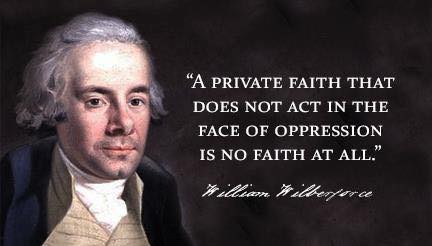The slave trade as we remember it began in the 15th century although people had been trading other people throughout the ages. Olaudah Equiano (a friend of William Wilberforce), who was a former slave explained, “…how he and his sister were captured by fellow Africans who then sold them on to eventually be exchanged with the ship owners and taken to work in Europe.”.
Merchants in England under a spirit of greed and deception despatched more than 10,000 voyages to Africa for slaves. The money from the slave trade built the rich fine mansions, established banks, funded other institutes and ports benefited too. The bankers, factory owners, slave owners and plantation owners all grew richer at the expense of the slaves. The profits also helped finance the industrial revolution and by the end of the 18th century approximately four million pounds had come into Britain from its West Indie plantations.
It was at this point that a man came onto the scene. His name, William Wilberforce*. William Wilberforce was seemingly alone in his fight against slavery especially at the start. However he did have scores of the host of heaven with him and he knew nevertheless that however corrupt the politicians were and however difficult they made his life, he had a mandate and that was to fight for the lives of ALL human beings. They ridiculed him, after all on the outside Britain had prospered from the slave trade (well they the rich had). The ordinary people however were not so easily persuaded. Poverty was still rocket high and the poor died in their youth and in appalling conditions. William Wilberforce knew the truth that if you distance yourself from corruption and lies and you fight for true justice you will reap the benefits not only as an individual but also as a nation.
However, they laughed and scorned him, to them they were completely right. It was the richest part of Britain’s trade and after all to them ‘Africans were thought to be sub-human, uncivilised, and inferior’. James Houston who worked for a firm of 18th century slave merchants wrote “what a glorious and advantageous trade this is…it is on the hinge of which all the trade of this globe moves”. His words may seem terrible and offensive now but in the wake of society he was only echoing what was indeed happening in his eyes. The elite and politicians were angry and disillusioned because they believed that they were being robbed of their livelihoods and many benefits, although many did receive compensation from the government in return for the freedom of their slaves.
In 1834 the slave trade ended. However, it is not surprising that in this same year the poor law amendment act was passed which took away many rights of the poor and pushed them into further poverty. This I believe was a distraction from the true benefits that Britain would later reap as a result of leaving the slave trade. There was fierce hostility and organised opposition from many and the amended act was eventually amended once again.
An assessment would highlight that the profits of slavery were more modest than the great bonanza that was once thought to have taken place, and that the contribution of slavery and the slave trade to national income was very marginal at best. Britain didn’t suddenly sink into the Mariana trench and disappear into the depths of the ocean. She didn’t suddenly find herself sucked into a storm and crashing mercilessly upon the rocks. It did indeed take a leap of faith to end the slave trade but when many millions of lives were set free abroad and at home something happened in the heavenlies and a great spiritual shift took place. God honoured those faithful abolitionists who gave their lives heart and soul for the cause.
During the Victorian era although Britain experienced a great many problems and there were a great many atrocities done in the name of ‘the empire’ many ordinary people did indeed climb out of poverty. Many great philanthropists were born, many inventors were successful and healthcare and education all improved vastly. The faith of the people grew and God was once again honoured in many homes and lives throughout the British Isles.
Slavery was abolished and I believe that because as a nation we took a stand against it we prospered and gained many benefits that in turn we could use the bless the rest of the world and that is what happened in many ways. Many listened to the words of these brave abolitionists who even risked their lives for their fight against slavery. Faith was very much a large part of society and even though yes there was still much poverty and evil where there was true faith there was true prosperity and blessing (Birmingham is one great example of this).
I feel that as a nation we need to take a stand once again. We need to become a forerunner on some of these giant global issues that are destroying lives whether it be physically, emotionally or spiritually. Is England ready to take the helm and launch into the open sea? I believe that yes we are and we will see wonders as a result. But we must be prepared to take up our cross and follow him first and foremost.
*William Wilberforce meaning: Resolute protector with wilful force (I just thought the name meaning was so interesting that I would share it with you)

Sources:
The Illustrated Rise and Fall of the British Empire by Lawrence James (Little, Brown, 1999)
The Oxford History of the British Empire: The Eighteenth Century edited by PJ Marshall (OUP, 1998)
Atlas of British Overseas Expansion edited by AN Porter (Routledge, 1994)
Kenneth Morgan (2014) Found at: www.bbc.co.uk/history/british/empire_seapower/trade_empire_01.shtml
abolition.e2bn.org/slavery_45.html (Accessed February 2017)



